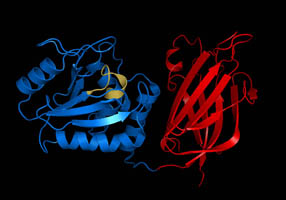Dephosphorylation
Dephosphorylation is the process of removing a phosphate group (PO4) from an organic compound by hydrolysis. This biochemical reaction is the reverse of phosphorylation, which involves the addition of a phosphate group to a molecule. Dephosphorylation is a crucial mechanism in the regulation of many cellular processes, including signal transduction, metabolism, and cell cycle progression.
Mechanism[edit | edit source]
Dephosphorylation is typically catalyzed by enzymes known as phosphatases. These enzymes hydrolyze the phosphate ester bond, releasing inorganic phosphate (Pi) and the dephosphorylated substrate. There are several types of phosphatases, including protein phosphatases, which act on phosphorylated amino acids in proteins, and nucleotidases, which act on nucleotides.
Types of Phosphatases[edit | edit source]
Phosphatases are classified based on their substrate specificity and the pH at which they function optimally. The main types include:
- Protein Tyrosine Phosphatases (PTPs) - These enzymes specifically dephosphorylate tyrosine residues on proteins.
- Serine/Threonine Phosphatases - These enzymes dephosphorylate serine and threonine residues.
- Dual-Specificity Phosphatases - These can dephosphorylate both tyrosine and serine/threonine residues.
- Alkaline Phosphatases - These function optimally at an alkaline pH and are involved in dephosphorylation of a variety of substrates.
Biological Significance[edit | edit source]
Dephosphorylation plays a vital role in various cellular functions:
- **Signal Transduction**: Dephosphorylation of proteins is a key step in the regulation of signal transduction pathways. For example, the dephosphorylation of MAP kinases by specific phosphatases can terminate signaling events.
- **Metabolism**: Enzymes involved in metabolic pathways are often regulated by phosphorylation and dephosphorylation. For instance, the enzyme glycogen synthase is activated by dephosphorylation, promoting glycogen synthesis.
- **Cell Cycle**: The progression of the cell cycle is tightly regulated by the phosphorylation state of various proteins. Cyclin-dependent kinases (CDKs) are activated or inactivated by phosphorylation and dephosphorylation, controlling cell cycle transitions.
Clinical Relevance[edit | edit source]
Abnormal dephosphorylation can lead to various diseases, including cancer, diabetes, and neurodegenerative disorders. For example, the dysregulation of protein phosphatases can result in uncontrolled cell proliferation and cancer. In Alzheimer's disease, abnormal dephosphorylation of the tau protein leads to the formation of neurofibrillary tangles.
See Also[edit | edit source]
References[edit | edit source]
External Links[edit | edit source]
Translate: - East Asian
中文,
日本,
한국어,
South Asian
हिन्दी,
தமிழ்,
తెలుగు,
Urdu,
ಕನ್ನಡ,
Southeast Asian
Indonesian,
Vietnamese,
Thai,
မြန်မာဘာသာ,
বাংলা
European
español,
Deutsch,
français,
Greek,
português do Brasil,
polski,
română,
русский,
Nederlands,
norsk,
svenska,
suomi,
Italian
Middle Eastern & African
عربى,
Turkish,
Persian,
Hebrew,
Afrikaans,
isiZulu,
Kiswahili,
Other
Bulgarian,
Hungarian,
Czech,
Swedish,
മലയാളം,
मराठी,
ਪੰਜਾਬੀ,
ગુજરાતી,
Portuguese,
Ukrainian
Navigation: Wellness - Encyclopedia - Health topics - Disease Index - Drugs - World Directory - Gray's Anatomy - Keto diet - Recipes
Search WikiMD
Ad.Tired of being Overweight? Try W8MD's physician weight loss program.
Semaglutide (Ozempic / Wegovy and Tirzepatide (Mounjaro / Zepbound) available.
Advertise on WikiMD
WikiMD is not a substitute for professional medical advice. See full disclaimer.
Credits:Most images are courtesy of Wikimedia commons, and templates Wikipedia, licensed under CC BY SA or similar.Contributors: Prab R. Tumpati, MD

